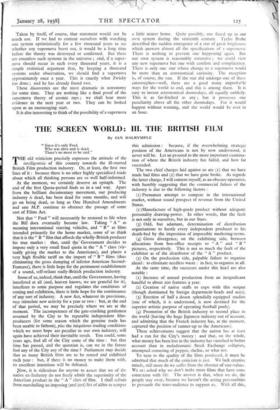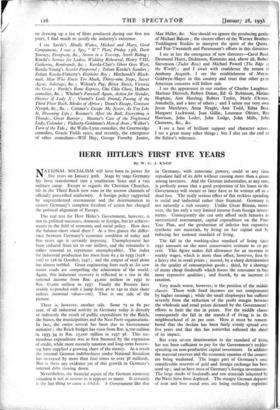THE SCREEN WORLD: III. THE BRITISH FILM
By IAN DALRYMPLE " Since it's only Fred, Who was alive and is dead, There's no more to be said."
THE old witticism precisely expresses the attitude of the intelligentsia of this country towards the ill-starred British Film production industry. Or, at least, the first two lines of it : because there is no other highly specialised trade about which all thinking persons are so well half-informed.
At the moment, we certainly deserve an epitaph. The end of the first Quota-period finds us in a sad way. Apart from the brilliant documentary movement, our producing industry is dead, has been dead for some months, and will go on being dead, so long as One Hundred Amendments and one M.P. continue to obstruct the passage of some sort of Films Act.
Not that " Fred " will necessarily be restored to life when the Bill does eventually become law. Taking " A " as meaning international starring vehicles, and " B " as films intended primarily for the home market, some of us think that it is the " B " film that affords the wholly-British producer his true market : that, until the Government decides to impose only a very small fixed quota in the " A " class (vir- tually giving the market to the Americans), and places a very high flexible tariff on the import of " B " films (thus eliminating the gross dumping of inferior American Second- Features), there is little hope for the permanent establishment of a sound, self-reliant really-British production industry.
Some of us, indeed, think that, until the Government, having interfered at all (and, heaven knows, we are grateffil for it), interferes to some purpose and regulates the conditions of renting and exhibition, there is little hope for the continuance of any sort of industry. A new Act, whatever its provisions, may stimulate new activity for a year or two : but, at the end of that period, we may be precisely where we are at the moment. The incompetence of the gate-crashing gentlemen assumed by the City to be reputable independent film- producers (for some reason which the genuine trade has been unable to fathom), plus the iniquitous trading conditions which we must hope are peculiar to our own industry, will again have achieved their inevitable result. You could, some years ago, fool all of the City some of the time : but that time has passed, and the question is, can we in the future fool any of the City any of the time ? Parliament may decide that so many British films are to be rented and exhibited each year : but, if there is no money to make them with, its excellent intentions will be defeated.
Now, it is ridiculous for anyone to assert that we of the native ex-Industry do not freely admit the superiority of the American product in the " A " class of film. I shall refrain from marshalling an imposing (and just) list of alibis to temper this admission : because, if the overwhelming strategic position of the Americans is not by now understood, it never will be. Let us proceed to the more important examina- tion of where the British industry has failed, and how far succeeded.
The two chief charges laid against us are (i) that we have made bad films and (2) that we have gone broke. As regards the latter charge, I will content myself, as an obscure operative, with humbly suggesting that the commercial failure of the industry is due to the following factors : (z) Premature attempt to compete in the international market, without sound prospect of revenue from the United States.
(2 )Manufacture of high-grade product without adequate personality drawing-power. In other words, that the fault is not only in ourselves, but in our Stars.
(3) Odd, but adamant, determination of distribution organisations to hustle every independent producer to his death-bed by the imposition of impossible marketing-terms.
(4) Gross divergence, on the exhibiting side, between allocations from box-office receipts to " A " and " B " pictures, respectively. This is not so much the fault of the exhibitor as of the distributor of the " A " product.
(5) On the production side, palpable failure to organise ahead : to eliminate needless waste : in fact, to organise at all.
At the same time, the successes under this head are also notable : (z) Increase of annual production from an insignificant handful to about zoo features a year.
(2) Creation of native staffs to cope with this output (though dominated by foreign department-heads and aces).
(3) Erection of half a dozen splendidly equipped studios (one of which, it is understood, is now destined for the superior artistic purpose of operating football pools).
(4) Promotion of the British industry to second place in the world (leaving the huge Japanese industry out of account, and admitting that the French industry has, at the moment, captured the position of runner-up to the Americans).
These achievements suggest that the nation has at least had a run for the City's money : and that, on the whole, what money has been lost in the industry has vanished to better account than in melodramatic Stock Exchange collapses, attempted cornering of pepper, shellac, or what not.
To turn to the quality of the films produced, it must be admitted that much of the criticism is just. We lack creative minds, still more do we suffer from the absence of star-values. We arz asked why we don't make more films that have some connexion with life. The answer is that, when we do, the people stay away, because we haven't the acting personalities to persuade the mass-audience to support us. With all this, on drawing up a list of films produced during out first ten years, I find much to justify the industry's existence. - I see Savile's Hindle Wakes, Michael and Mary, Good Companions, I was a Spy, " W " Plan, Friday 13th, Dark Tourney, Evergreen, &c., Storm in a Tea-cup, South Riding ; Korda's Service for Ladies, Wedding Rehearsal, Hairy VIII, Catherine, Rembrandt, &c. ; Korda-Clair's Ghost Goes West, Korda-Young's Scarlet Pimpernel ; Zoltan Korda's Sanders ; Zoltan Korda-Flaherty's Elephant Boy ; Hitchcock's Black- mail, Man Who Knew Too Much, Thirty7nine Steps, Secret Agent, Sabotage, &c. ; Wilcox's Peg, Bitter Sweet, Victoria the Great ; Forde's Rome Express, Chu Chin Chow, Hulbert comedies, &c. ; Whelan's Farewell Again, Action for Slander, Divorce of Lady X; Viertel's 'Little Friend, Passing- of the Third Floor Back, Rhodes- of Africa ; Dean'S Escape, Constant Nymph, &c., &c. ; Czinner's Escape Me Never; As You Like It, Dreaming Lips ; Rosmer's After the Ball, Everything is Thunder, Great Barrier ; Hunter's Case of the Frightened Lady, Calendar ; Flaherty-Goldman's Man of Aran ; Walker's Turn of the Tide- ; the Walls-Lynn comedies, the Couitneidge comedies, Grade Fields epics, and recently, the "emergence of other comedians—Will Hay, George Formby Junior, Max Miller, &c. Nor should we ignore the producing genius °Michael Balcon ; the sincere effort of the Warner Brothers Teddington Studios to interpret the spirit of the Quota ; and Fox-Twentieth and Paramount's efforts in this direction.
I see at last the emergence of new directors—Carol Reid. Desmond Hurst, Dickinson, Kimmins and, above all, Robert Stevenson (Tudor Rose) and Michael Powell (The Edge of the World) ; and I await with confidence the return of Anthony Asquith. I see the establishment of Metro- Goldwyn-Mayer in this country and trust that other grzat American concerns will follow suit.
I see the appearance in our studios of Charles Laughton, Marlene Dietrich, Robert Donat, Ed. G. Robinson, Miriam Hopkins, Ann Harding, Robert 'Taylor, Merle Obzron, Annabella, and a host of others ; and I salute our very own Jessie Matthews, Anna Neagle, Ann Todd, - Edna• Best, Margaret Lockwood, Jean Gillie, . Laurence • Olivier; Rex Harrison, John Loder, John Lodge, John Mills, John Clements, &c., &c.
I see a host of brilliant support and character actors. I see a great many other things ; but I also see the end of the Editor's tolerance.



















































 Previous page
Previous page